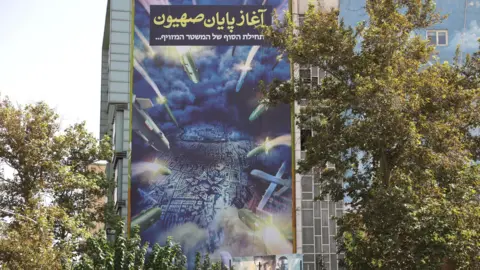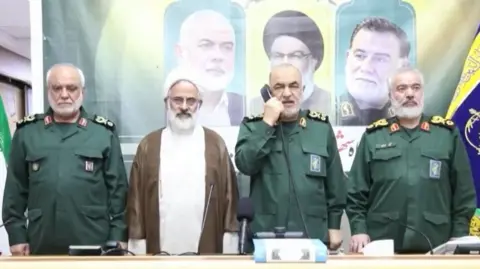Iran gambles with Israel attack after humiliating blows to allies
Analysing where Iran's missiles struck in Israel
The commander-in-chief of Iran’s Islamic Revolution Guard Corps (IRGC), Maj-Gen Hossein Salami, stood in front of a large banner in a war room as he used a telephone to order the launch of about 200 ballistic missiles at Israel on Tuesday night, according to a video clip published by Iranian media.

The banner featured photos of the three men whose deaths he said Iran was seeking to avenge with the major attack - Hamas political leader Ismail Haniyeh, who was killed in Tehran in July in an attack that Iran blamed on Israel, and Hezbollah leader Hassan Nasrallah and IRGC Quds Force operations commander Brig-Gen Abbas Nilforoushan, who were killed in an Israeli air strike in Beirut last week.
The IRGC claimed the barrage included Fattah hypersonic missiles that took 12 minutes to reach Israel and that they successfully hit targets including three Israeli airbases and the headquarters of the Mossad spy agency.
However, the Israel Defense Forces (IDF) said most of the missiles were “intercepted by Israel and a defensive coalition led by the United States”, and that there were a “small number of hits” in central and southern Israel.
Shortly after the attack, a massive banner was raised in Tehran’s Palestine Square, featuring missiles flying towards buildings shaped like a Star of David and the words “The beginning of the end of Zionism”.
Wana/Reuters
A banner proclaiming “The beginning of the end of Zionism" was hung from a building in Tehran shortly after the attack
Iran had appeared to show restraint after Haniyeh's assassination - but this inaction became a source of humiliation when Israel dealt a series of devastating blows to Iran’s closest and most longstanding regional ally Hezbollah, culminating in the air strike on Friday that killed Nasrallah and Nilforoushan.
Iranian weapons, training and funding have been pivotal to Hezbollah’s transformation into Lebanon’s most powerful armed force and political actor since the IRGC helped establish the group in the 1980s.

Before this month, Iranian leaders had hoped that a war of attrition with Hezbollah would help wear down the Israeli military, which is still fighting a war against Hamas in Gaza.
They also relied on Hezbollah and its massive arsenal of rockets and missiles to serve as a major deterrent against direct Israeli attacks on their country’s nuclear and missile facilities.
President Masoud Pezeshkian, who was elected in July, accused Israel of trying to provoke Iran into a regional war that would also draw in the US.
"We also want security and peace. It was Israel that assassinated Haniyeh in Tehran," he was quoted by Iranian media as saying during a visit to Qatar on Wednesday.
"Europeans and the US said that if we do not act, there will be a peace in Gaza in one week. We waited for them to have peace but they increased their killing."
Many hardline conservatives in Iran had been growing uneasy about the country's lack of action against Israel.
Several commentators on state TV - which is controlled by the Supreme Leader, Ayatollah Ali Khamenei, and the IRGC - argued that the decision to hold back from seeking revenge for Haniyeh’s killing had emboldened Israeli Prime Minister Benjamin Netanyahu to attack Iran's interests and allies in Lebanon.
After Tuesday's missile attack, the chief of staff of the Iranian Armed Forces Maj Gen Mohammad Baqeri stated that the time for “patience and restraint” was over.
“We targeted military and intelligence sites in Israel and deliberately refrained from hitting economic and industrial locations,” he said. “However, if Israel retaliates, our response will be more forceful.”

The missile attack reflects a growing concern among Iranian leaders that remaining silent after Israel's attacks would portray them as weak and vulnerable - both domestically and in the eyes of their regional allies in the so-called “Axis of Resistance” which includes Hezbollah and Hamas.
IRIB
Maj-Gen Hossein Salami (2nd right) was filmed ordering Iran's missile attack on Israel from a war room
Iran and Israel have pursued a shadow war for decades, adhering to a policy of “no war, no peace”. However, it now appears that this status quo is ending.
Israel has vowed to respond severely, with Netanyahu warning that "Iran made a big mistake and it will pay for it".
There are also indications of a shift in tone and strategy from the US.
In April, President Joe Biden urged restraint after Israeli and US-led forces shot down most of the 300 drones and missiles that Iran launched at Israel in retaliation for an air strike on the Iranian consulate in Syria that killed several top IRGC commanders. Israel heeded the US call and responded by launching a missile that hit an Iranian air defence battery in central Iran.
But this time, Biden’s National Security Adviser Jake Sullivan warned there would be “severe consequences” for the Iranian attack and that the US will “work with Israel to make that the case”.
Israeli media cited Israeli officials as saying on Wednesday that Israel was preparing for retaliatory strikes on Iran “within days”, and that they would target “strategic sites”, including the country’s vital oil facilities.
The officials also warned that Iran’s nuclear facilities would be hit if it made good on its threat to strike back at Israel.
Senior Iranian officials have asserted that they consider their retaliation for the killing of Haniyeh, Nasrallah and Nilforoushan to be over unless they are provoked further.
Foreign Minister Abbas Araghchi also said he had conveyed a message to the US through the Swiss embassy in Tehran warning it “not to intervene”.
He cautioned: “Any third country that assists Israel or allows its airspace to be used against Iran will be considered a legitimate target.”
The US has approximately 40,000 troops stationed in the Middle East, with many deployed in Iraq and Syria. These troops could be threatened by Iran-backed Shia militias in both countries.
Iran must now brace itself for the Israeli response and hope its gamble pays off.









































